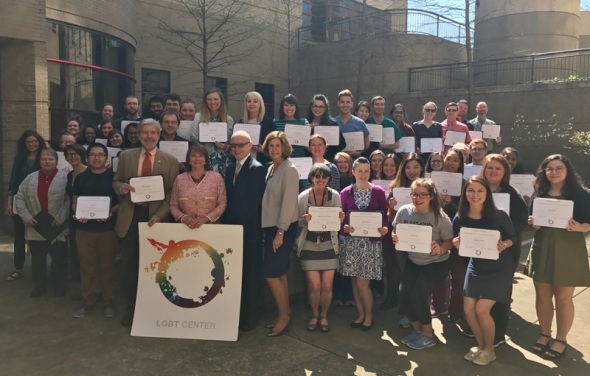Kornhauser Librarian Earns LGBT Health Competency Certificate
Posted: May 2, 2017 Filed under: Kornhauser Health Sciences Library, People, University of Louisville, University of Louisville Libraries | Tags: Clinical librarian, Jessica Petrey, LGBTQ Leave a commentRanked one of the most LGBT-friendly universities in the south, the University of Louisville provides a variety of supportive services for the LGBT community, and also training for those who serve or interact with these individuals. One such program targets future doctors, dentists, nurses and health care workers and culminates in a LGBT Health Competency certificate.
Over the 2016-2017 academic year, Kornhauser librarian Jessica Petrey availed herself of this training, and recently earned her certificate by attending seven live and one online sessions.
The coursework aims to develop awareness and compassion for LGBT patients, and includes an overview of LGBT health; medical and legal disparities affecting LGBT patients; medical implications of prolonged cross-sex hormone therapy; how to create a welcoming environment to improve health outcomes, and other classes.

UofL health care personnel who recently earned their LGBT Health Competency certificate. (Petrey is in the front row, third from the right, in a pink sweater.)
We caught up with Petrey to ask a few questions about her experience:
Q. How does this training augment your work as a clinical librarian?
A. Most people attending these trainings are either current or future healthcare providers, so my benefits as a librarian were a little different than the average attendee. In addition to the health information and clinical training we all received, I was able to pay attention to the kinds of questions other attendees were asking and make note of resources we could gather and make available to our patrons. It also gave me the opportunity to network with faculty and students and promote not only the electronic resource guides I have created for them as part of Kornhauser’s LGBT initiative but also my literature searching services on LGBT reference questions.
Q. What was the most difficult part of the training?
A. Stories of disparities, stigma, and discrimination are always the hardest—but perhaps most important—part of these kinds of discussions. Even for those of us who are at least somewhat aware in the abstract of statistics regarding violence, discrimination, and barriers to care, it’s entirely different and much more real hearing the personal accounts of people who have had and continue to have these experiences. The sensitivity to those experiences is so much more important in empowering attendees in providing competent care than any information a textbook could provide.
Q. What was the most surprising aspect of these sessions?
A. I come from a very conservative area, so I was continually (and positively!) surprised at how well attended and supported each session was. It’s so great knowing that our university is working intentionally to reduce those disparities, and having buy-in from students and faculty from all four professional schools, campus offices, and the broader community is integral to that work being successful.
Q. Did you have a favorite session?
A. The variety of session structures and topics was one of the most positive aspects of the series, but my personal favorite session was the one with Dr. Koch. She is a trans woman who transitioned later in life, and was able to speak to both the technical clinical information about the transition process from a provider perspective and share her more personal experiences as a trans woman and patient. It was a privilege to listen to someone who could provide such a complete, enlightening picture of the whole process.

Q. Biggest lesson learned?
A. Probably leaving space for people to assert their own identities, rather than making assumptions. For healthcare providers with patients in particular, maybe that means introducing yourself and mentioning your own pronouns to ask for someone else’s, asking people what an identifier means to them, providing blank space on intake forms to write in orientation and gender rather than checking boxes, mirroring a person’s own language when referring to partners and identities, or some other tangible step you can take to establish a rapport of acceptance and understanding with an individual. Even though the focus of this course was to train healthcare providers, I think curating an approach of understanding and acceptance is a skill that can and should translate to our personal lives as well.